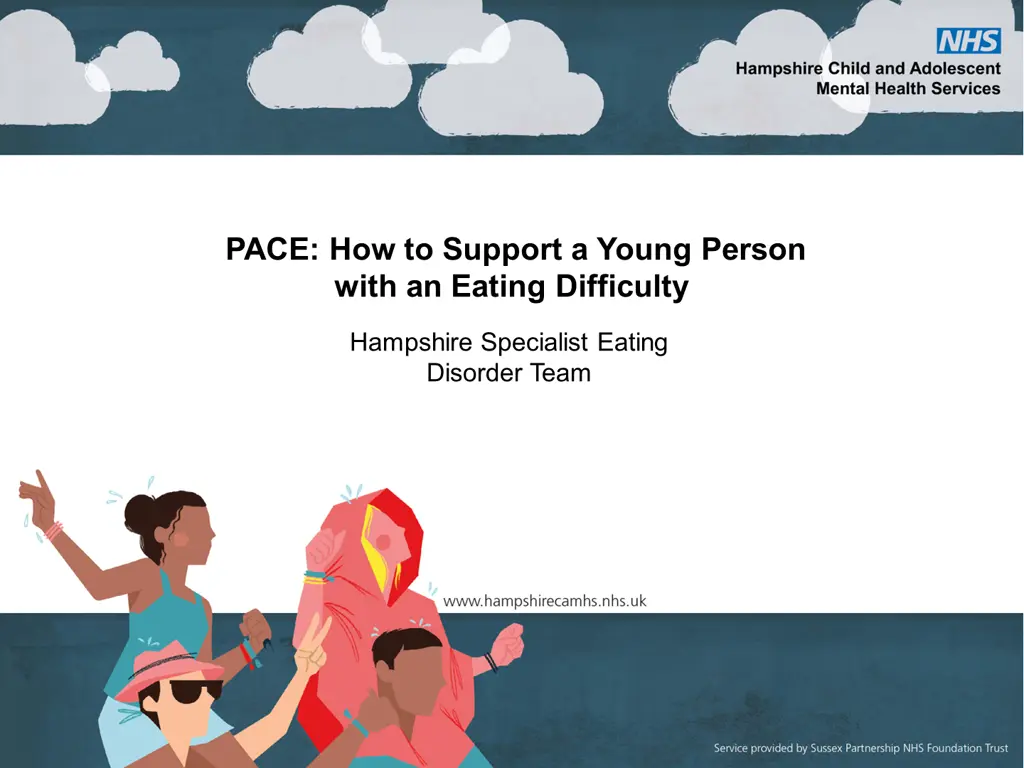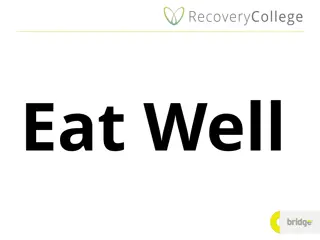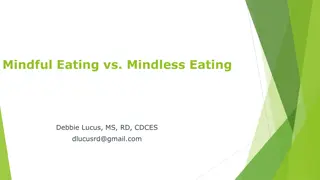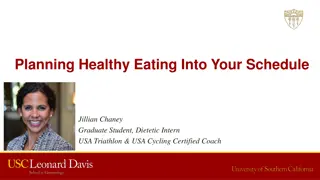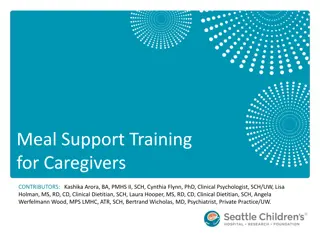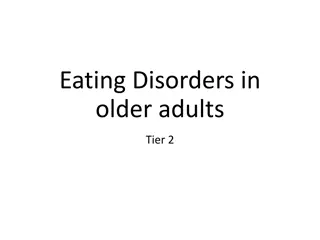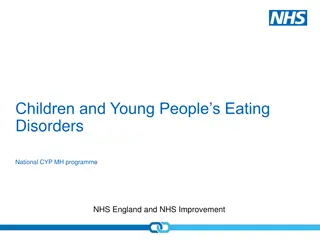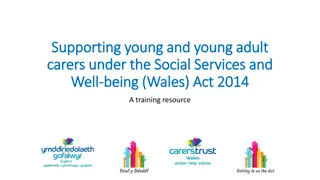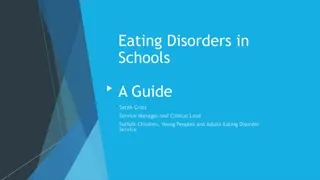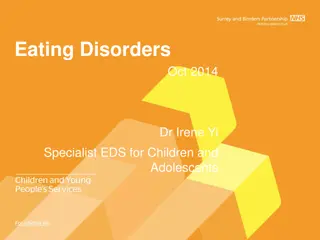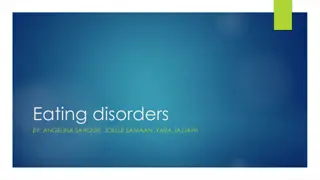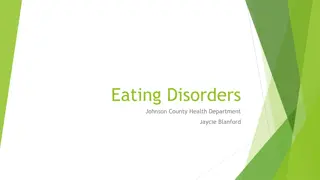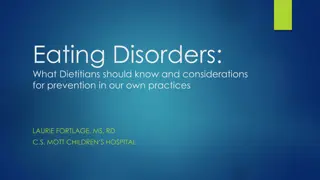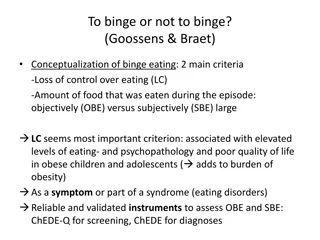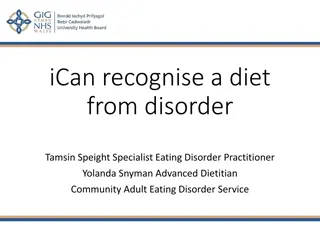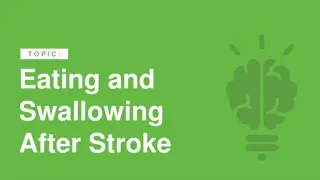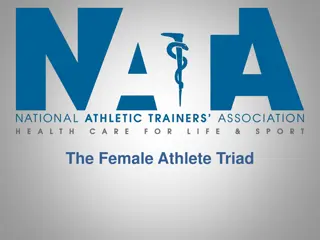Supporting Young People with Eating Difficulties
Learn how to provide effective support for young individuals facing eating challenges. Insights from Hampshire Specialist Eating Disorder Team.
Download Presentation

Please find below an Image/Link to download the presentation.
The content on the website is provided AS IS for your information and personal use only. It may not be sold, licensed, or shared on other websites without obtaining consent from the author. Download presentation by click this link. If you encounter any issues during the download, it is possible that the publisher has removed the file from their server.
E N D
Presentation Transcript
PACE: How to Support a Young Person with an Eating Difficulty Hampshire Specialist Eating Disorder Team
What are Eating Disorders? Eating disorders are serious mental illnesses affecting people of all ages, genders, ethnicities and backgrounds. People with eating disorders may feel their eating difficulties are their way to cope with difficult situations or feelings. This behaviour can include limiting the amount of food eaten, eating very large quantities of food at once, getting rid of food eaten through unhealthy means such as making themselves sick; using laxatives; fasting or excessive exercise or combination of these behaviours.
Overview Some stats and facts What to look for; some signs and symptoms Next steps Top tips on how to support a young person Some quick Q&A
What are Eating Disorders? 1.6 million people in the UK are estimated to be directly affected by eating disorders (11% male) 14-25 year olds are most affected by an eating disorder AN ave age onset 16-17years Ave duration of illness 7years Approx 45% fully recover, 33% improve, 20% chronic 20% of AN die prematurely (physical health compromise/ suicide)
Types of Eating Disorder Anorexia Nervosa Orthorexia Bulimia Nervosa Binge Eating Disorder OSFED- (Other Specified Feeding or Eating Disorder) ARFID- ( Avoidant/Restrictive Food Intake Disorder)
What to look out for Symptoms and Signs- Psychological: -preoccupation with body image, food, dieting, exercise -fear of gaining weight -change in mood (may be happier initially), personality change, other mental health issues e.g. anxiety/ irritability/obsessional behaviours -high interest in food preparation, calorific information of different foods -poor concentration
What to look out for Symptoms and Signs- Physical: -weight loss or lack of expected weight gain -fainting or dizziness -loss of energy, coldness, weakness -poor sleep -amenorrhoea -constipation -hair thinning, lanugo hair, callouses on hands
Identifying Eating Disorders Symptoms and Signs- Behavioural: -change in eating habits, secretive, hiding food, avoidance of certain foods -increased exercise -vomiting, use of laxatives/appetite suppressants/diuretics; often going to the toilet -school and social functioning altered -wearing baggy clothes -obsessional behaviours
Next Steps Speak to the school/ college/ any other agency involved in supporting/ looking after your young person Speak to your young person See GP
What to ask? Ideas ONLY You know your child and how best to approach however a calm, compassionate, curious and non judgemental approach can be beneficial. Are you concerned about your weight? Have you lost weight? Are you trying to lose weight? What is your ideal weight? Have you cut down on the amount you are eating? What is your typical day s food and fluid intake? Are there any foods you avoid? How much exercise do you do? Have you tried anything else to lose weight? (laxatives, diuretics, appetite suppressants, vomiting) Any physical symptoms? Loss of periods? Any self harm or thoughts of self harm or suicide?
Top Tips Get as much support as possible (both personal and professional) Take things one day at a time Try to stay calm Be consistent, clear and boundaried in expectations Take more active responsibility in mealtimes (e.g., menu planning, meal preparation, serving of food) No diet/ low fat/ fat free foods Eat as a family where possible Model appropriate eating behaviour (avoid dieting) Plan non-problem focused talk Distraction activities post meals Try to find motivators with your young person
Carer Reactions Carer Emotions
Things not to say https://www.bbc.co.uk/bbcthree/clip/31b6bfb9-9d64-4445-9690-c633b727cf89
Please remember It s not anyone s fault; nobody has caused the eating disorder It is an illness the same as any other illness You/ the family are the greatest resource in recovery Physical health recovery occurs more quickly than psychological recovery Psychological recovery can take a long time Health and happiness needs to be prioritised
Family based intervention Prevent hospitalisation/aid YP in returning to adolescents unencumbered by ED Assisting parents in aiding YP s recovery Two Treatment Trials-Maudsley Two Thirds recovered by end of FBT 75%-90%-fully recovered on five year follow up Psychological improvement American studies showing similar results Maudsley discharge data First line intervention in revised NICE 2017
Referrals Referrals must be made by GP Why??? Current physical health information is vital to ensure timely assessment Knowing a physical weight is important but not the only factor rate of weight loss, concerning behaviours, other physical concerns Weight for height (BMI) Rate of weight loss Pulse (awake) Dizziness or postural drop in BP BP < 2 centile (systolic 88-105 diastolic 40-45) Cool peripheries and capillary refill time QTc interval on ECG <15 years 440-460, girls >15 450-460, boys >15 430-450 Fluid restriction / dehydration Level of Food restriction Bingeing Biochemical abnormalities Syncope (collapse) Tachycardia / bradycardia Temperature
Hampshire Eating Disorder team 3 hubs across Hampshire North: covers Basingstoke and Aldershot South: covers New Forest, Winchester & Andover, Eastleigh South East: covers Fareham, Gosport, Havant and Petersfield Multi-disciplinary Team Nurses Medics Systemic Therapists Psychologists Occupational Therapists Support Workers
Hampshire Eating Disorder team The Access and Waiting Time Standard for Children and Young People with an Eating Disorder was published in 2015, and applies to children and young people up to the age of 19. The standard states that by 2020, 95% of those referred for assessment or treatment for an eating disorder should receive NICE-approved treatment within one week in urgent cases, and four weeks in routine/non-urgent cases. The ability of services to meet this standard has been monitored since 2016.
Hampshire Eating Disorder team RESOURCES https://www.beateatingdisorders.org.uk/ Janet Treasure https://www.feast-ed.org/ Eva Musby YouTube and book https://hampshirecamhs.nhs.uk/
